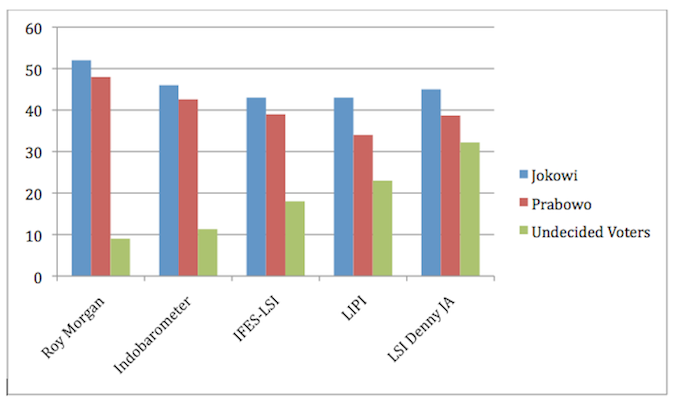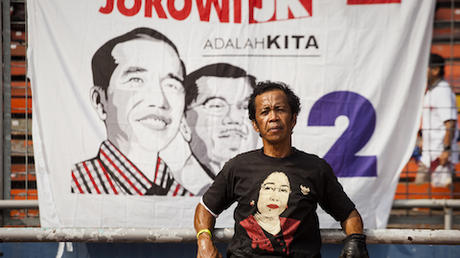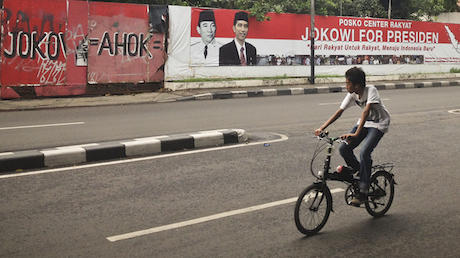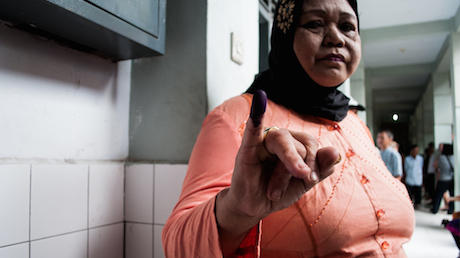
Australian-based pollster Roy Morgan Research released its latest survey on 1 July 2014, declaring the result for next week’s Indonesian presidential election too close to call. It has Joko “Jokowi” Widodo on 52 per cent, narrowly ahead of Prabowo Subianto with 48 per cent of votes. Meanwhile nine per cent of respondents have not yet decided which candidate they will support .
The Morgan poll is regarded as one of the most comprehensive on the Indonesian race, surveying 3177 electors in face-to-face interviews in all 34 provinces in June. While Jokowi clings to what remains of his early lead, Prabowo shows a steady increase in support as election day, 9 July, looms.
With a week to go major Indonesian pollsters also suggest that the Prabowo-Hatta ticket has tracked an increased trend in the last few weeks. Indobarometer, one of Indonesia’s major pollsters, released its latest survey on 29 June 2014 with Jokowi-JK at 46 per cent, Prabowo-Hatta at 42.6 per cent and 11.3 per cent of voters undecided. (The pollster interviewed 1200 electors using a multi-stage random method in 33 provinces during 16-22 June.)
Muhammad Qodari, the director of Indobarometer, admits the neck-and-neck numbers mean it’s impossible to back a winner. In a press conference in Jakarta last week, his agency hedged its bets with the following predictions:
- Jokowi will win if he can maintain his electability through the last week of the campaign and if the undecided voters cast their votes proportionally, or:
- Prabowo will win can push up his electoral appeal in the last leg and claim more of the undecided voters.
Indobarometer suggests that there has been a significant change in voter inclination over the past month. The long-time favorite ticket, Jokowi-Kalla, lost four per cent of votes over the course of the campaign. Meanwile Prabowo-Hatta gained six per cent of votes.
A similar finding was also tracked by IFES (International Foundation for Electoral System) in cooperation with Indonesian Survey Institute (Lembaga Survey Indonesia). That survey suggests 43 per cent of respondents will vote for Jokowi, and 39 per cent for Prabowo. The margin between the two candidates is only 4 per cent, with 18 per cent of voters undecided. (IFES and LSI conducted its latest survey on 1-10 June, questioning 2009 respondents face-to-face.
Meanwhile Political Research Center of Indonesian Knowledge Institute, a government-funded body, released its poll last week showing Jokowi with a nine per cent over Prabowo. (The institution conducted its poll on 5-14 June with 790 respondents in 33 provinces, via face-to-face interviews.) The survey asked the electors: “If the presidential election is held today, who will you vote for?” The result shows that Jokowi-JK received 43 per cent over Prabowo-Hatta with 34 per cent, with 23 per cent of voters undecided.
The Political Research Center also surveyed electors’ loyalty to the political parties, asking whether they voted for the party or its coalition in the parliamentary election held in 9 April. The survey suggested that Jokowi’s coalition is more solid compared to that of Prabowo, with 60.4 per cent of voters who voted for PDI-P/Nasdem/PKB/Hanura (Jokowi’s coalition) saying they will vote for Jokowi, meanwhile only 48.2 per cent of voters who voted for Gerindra coalition will vote for Prabowo in the presidential election.
Another major pollster, Lingkaran Survey Indonesia Denny JA, in its latest poll predicts that margin of the presidential election would be less than five per cent.
The pollster plotted Jokowi leading with 45 per cent over Prabowo with 38.7 per cent. According to Fitri Hari, a researcher from LSI Denny JA, the undecided voters in its latest survey reached 32.2 per cent. At a press conference last week in Jakarta, LSI Denny JA also presented a series of surveys since September 2013.
These showed that last year Jokowi’s electability reached 50.3 per cent against Prabowo at 11.1 per cent. However, by March 2014, Jokowi’s electability had decreased to 46.3 per cent, meanwhile Prabowo crept up to 22.1 per cent.
The downward trend for Jokowi continued in May 2014 when both candidates announced their running mates. Jokowi-Kalla led then with a narrow margin 35.42 per cent over Prabowo-Hatta 22.75 per cent. By early June, Prabowo-Hatta reached 38.7 per cent against Jokowi-Kalla 45 per cent.




